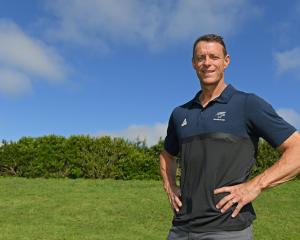Rowers Caroline and Georgina Evers-Swindell have had a brutal self examination ahead of their Olympic title defence, following a B-grade dress rehearsal.
In their final competitive outing before the Beijing Olympic Games, they were stunned to be in June relegated to a World Cup double sculls B final in Poland.
It was a shock, considering the formidable record the 29-year-old identical twins have constructed since winning silver at the world championships in 2001.
Apart from Olympic gold, there have been three world championship crowns, and a host of World Cup wins.
But in Poznan they were last in their heat and repechage, a galling experience so close to their gold medal defence at the Shunyi Olympic Rowing Park.
Initially reluctant to discuss their alarming non-performance, the twins and their coach Richard Tonks retreated to Lake Karapiro to try to determine exactly what went wrong.
They thought they had been physically and mentally prepared.
Instead they rowed messily, a couple of bad strokes sealing their fate until they met virtually no opposition in the B race, winning in a pedestrian seven minutes 31.45 seconds.
Elise Laverick and Anna Bebington won the medal race for Great Britain in 7:15.62. The technically flawless Chinese world champions Qin Li and Liang Thian were not at the regatta.
A period of reflection and introspection followed Poland, with Caroline admitting it was a taxing exercise.
"There isn't one answer. If there was, our job and Richard's job over the last few weeks would have been a lot easier," she said.
Tonks offered one technical explanation; an experimental oar change was, on reflection, unwise.
"We were experiencing with a new manufacturer and now we've gone back to our normal gearing," he said, dismissing the failure as a one-off.
With their Italian-made skiff restored to its customary set-up, the twins were now dealing with the mental issues as a result of Poland.
Rod Corban, a sports psychologist based at Wintec in nearby Hamilton, has been a welcome sounding board.
"He's had to put up with a lot," Caroline said.
"We really rate the use of sports psychologists -- it plays a big part in terms of your performance and it's a really important aspect for us at the moment." Yet the events in Poznan cannot be entirely blocked out, Caroline said.
"You can't wipe it out. It's funny. You remember the bad times a lot more than the good times," she said.
"We can use it as motivation. If we think about it kind of spurs us on a little bit.
"I have to say we're in a lot better frame of mind now than when we arrived back in New Zealand." Evers-Swindell was buoyed by the fact their recent training on and off the water had barely skipped a beat.
They drew confidence from matching up against teammates, including Storm Uru and Peter Taylor, the lightweight double scullers.
"We know that when we're competitive out there with the other crews it actually means something. They're world class -- it's quite encouraging in that sense."












